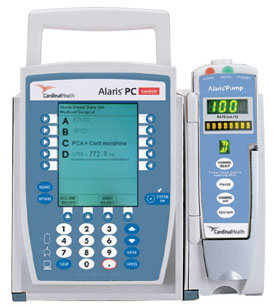Alaris System: “The Alaris® System by Cardinal Health is designed for infusions and patient monitoring. It helps protect the patient and clinician from consequences of medical errors and helps positively affect patient outcomes through continuous improvements in clinical practice. The point-of-care platform standardizes every type of infusion on a common user interface and adds respiratory monitoring and bar coding as needed. Also a state-of-the-art computer, it bridges the gap between IV and IT to help prevent harm and optimize care.”

The Alaris System utilizes “smart pumps†combined with software to create limits, called guardrails, on infusion concentrations and rates. There are two types of guardrail limits: a soft stop and a hard stop. A soft stop provides a warning whenever a preset limit is exceeded. When appropriate, the soft stop may be overridden and the infusion given. Hard stops on the other hand provide similar warnings, but cannot be overridden. When a hard stop is reached, the pump must be reprogrammed within the hospital’s guardrail limits before the infusion can begin.
Profiles with libraries containing several hundred medications can be created with medication concentration and infusion rate guardrails specific to each nursing unit. Profiles are designed around specific patient populations, which means profiles for critical care are different than those for general medicine. For example: a patient on a general medicine floor may be eligible for a dopamine infusion with a maximum infusion rate of 10 mcg/kg/min while a patient in a critical care unit may be able to receive dopamine up to a maximum of 20 mcg/kg/min before being stopped by the guardrails software.
The information from both soft stops and hard stops is recorded by the pump’s software and can be used by various departments to track “near misses” and perform education when necessary.
Leave a Reply